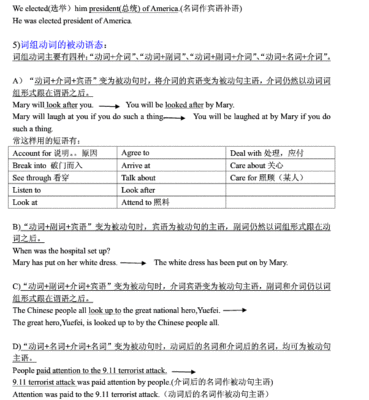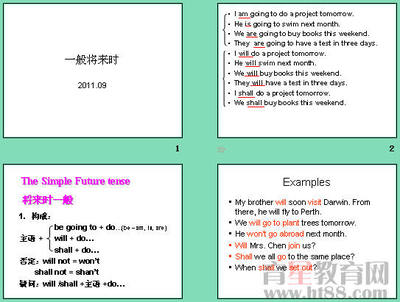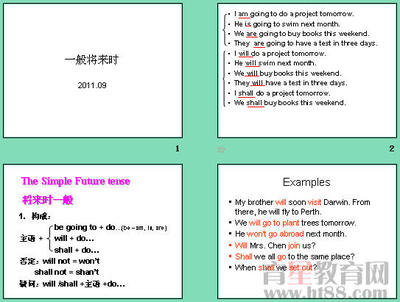一般将来时讲解与练习 一、概念:表示将要发生的动作或存在的状态及打算、计划或准备做某事。 句中一般有以下时间状语: tomorrow, next day(week, month,year…),soon, the day aftertomorrow(后天)等。 won’t。 例如:I’m going tohave a picnic this afternoon. → I’m not going to have a picnic thisafternoon. 第一二人称互换。 例如:We are going togo on an outing this weekend. → Are you going to go on an outing thisweekend? 况。 1.问人。Who 例如:I’m going to NewYork soon. →Who’s going to New York soon. 2.问干什么。What …do. 例如:My father is going to watch arace with me this afternoon. →What is your father going to do withyou this afternoon. 3.问什么时候。When. 例如:She’s going togo to bed at nine. →When is she going tobed? I am going to go swimmingtomorrow(明天). = I will go swimmingtomorrow. be goingto和will的用法虽然都表示将来发生动作或情况,但 它们的用法是有区别的。现本人就牛津小学英语课本归纳、浅析 如下: She’s going to play the piano.她打算弹钢琴。 (2)、表示根据目前某种迹象判断,某事非常有可能发生。E.g. 2、表示不以人的意志为转移的自然发展的未来的事。eg: 练习: 一、填空。 I ________ _______ _________ have a picnic withmy friends. 2.下个星期一你打算去干嘛? 我想去打篮球。 What ________ ________ _________ __________________ next Monday? I _______ ________ _______ playbasketball. 3.你妈妈这个周末去购物吗?是,她要去买一些水果。 ________ your mother _______ ________ go shoppingthis ___________? Yes, she _________. She ______ __________________ buy some fruit. What time _______ you _________ __________meet? Nancy ________ going to go camping. I _______ go ______ join them. ________ _______ ________ to get up at 6:30tomorrow? _______ ________ meet at the bus stop at10:30? ________ _______ she ________ ________ _________after school? _________ _________ going to see a play the dayaftertomorrow? afternoon. He ______________ (go) to school by bike. I usually __________ (watch) TV and__________(catch) insects? She_________ (watch) TV and _________ (catch) insects. I ____________ (pick) apples on afarm. What ______________ (do) nextSunday? I ______________ (milk) cows. 参考答案 1. am, going, to2. are, you, going, to, do 3.Is, going, to, week, is, is, going, to 4. are, going, to5. isn’t 6. won’t, or 7. Are, you, going 8. Will,you 9. What, is, going, to, do 10. What,are 11.are going to have 12. is going 13. goes, is going 14. watch, catch 15. is, goingto do, is going to watch, catch 16. did, picked, are you going to do, am going tomilk 17. is going to visit 18. flew 19. is going to give 20. amplanning |
一般将来时讲解与练习
更多阅读

郭老师讲初中英语语法:一般现在时态讲解及练习
语法讲解我的自白书——“一般现在时”用法再回首 Hello!大家好!还记得我吗?我是“一般现在时”啊!相信你们都还记得我,也许你会说,我不就是表示动作是经常性、习惯性的一种时态吗?是的,咱们也都知道,句中的时间状语可确定动词所用的时

一般现在时态,现在进行时,一般过去时,一般将来时,现在完成时 现在进行时表将来ppt
一.一般现在时用动词原形表示,但单数第三人称后要加-S,在词尾加-s 时要注意:1. 一般情况:加-s 例,reads,writes,says2. 以s,x,ch,sh收尾的词加-es 例:teaches,washes,guesses3. 以辅音字母+y结尾的词变y为I 再加-es 例:try-tries。Carry-carries。这个
一般过去时,一般现在时和一般将来时 一般现在时表示将来时
一般过去时表示(1)过去某个特定时间发生,并且一下子就完成了的动作(即:非持续性动作),也可以表示(2)过去习惯性的动作。一般过去时不强调动作对现在的影响,只说明过去。(1) I had a word with Julia this morning.今天早晨,我跟朱丽亚说了

一般将来时态讲解及练习
一般将来时de 自述大家好!我是你们的老朋友了,还记得我是谁吗?看仔细了,我是一般将来时态啊!在英语中,我表示将来某个时间要发生的动作或存在的状态,常与tomorrow morning, next year, the day after tomorrow等表示将来的时间状语连用。那
 爱华网
爱华网